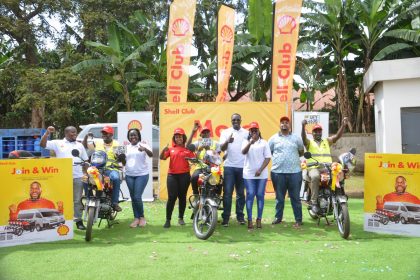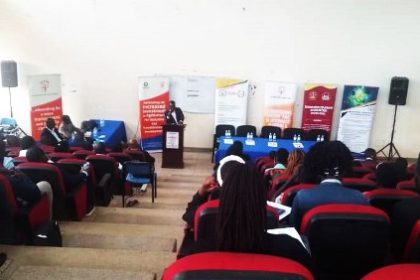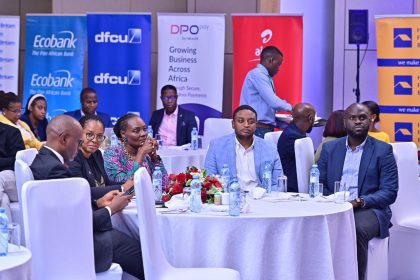Road to African-owned fintech network littered with hurdles
 In Uganda there are more mobile money accounts than bank accounts.
In Uganda there are more mobile money accounts than bank accounts.
In Nigeria, the financial technology (fintech) firm, Opay, is the talk of town. A growing number of people are excitedly taken up by the selection of options this company offers them.
Speaking at the second African Fintech Network Festival in Kampala recently, Prof. Ndubuisi Ekekwe held participants spellbound by Opay’s growing popularity in a presentation of how a fintech can radically change ordinary lives for the better.
On one digital platform, Nigerians can buy airtime, pay bills, hail for transport, buy food and even top up their sports betting accounts. This puts Opay’s bigger and more established rival, Paga in the shade because it cannot do the same.
Opay is already reporting $5 million in daily transactions. In less than a year since setting business in Africa’s most populous country, Opay has signed up 40,000 agents and become an integral part of many Nigerians lifestyle.
“Fintechs get closer to the customer than banks; serve the customer better, because they can anticipate customers’ perceptions, expectations and needs,” Prof. Ekekwe said.
But there is catch. Opay Nigeria is Chinese owned after the Norwegian founders sold out their Opera technology company in 2016 for $600 million.
The owners of Kenya’s most popular quick loans provider, Tala, are based in Santa Monica, California. Foreign ownership of some of Africa’s most widely used fintechs is a source of concern for AFN which is intent on championing continental champions to compete.
Wouldn’t it be much better if these financial services are provided by homegrown fintechs using homegrown apps so that most of the profits stay at home?
The irony is digital payments were pioneered in Kenya by telecom network Safaricom and its M-pesa mobile money product sparked a revolution that is still ongoing across Africa and the rest of the world.
Fintechs have proven to be the cheapest means to speed up access to financial services for the unbanked and also increase financial inclusion. On the other hand, most of the speakers were careful not to flout fintech flexibility in the faces of traditional bankers.
For one thing, Ecobank, the Togo-based transnational, is a strong supporter of the AFN and it was joined by Stanbic Bank and Citibank in sponsoring the Kampala event. The other advantage banks have, is more money and clout to develop their own competing digital offerings to retain customers, especially those with trust issues. Instead, collaboration is seen as far better in an expanding market.
African fintech start-ups have a better chance of attracting venture capital if investors see there is a clear need for the service or that its use will guarantee a an assured revenue stream. Noha Shaker, Founder and President, Egyptian FinTech Association said the size of market also matters. “How solid are founders and the management team? Focus on partnerships with existing financial institutions and not be seen as competition, but adding value. No bank has found a model that can serve the bottom end of a pyramid.”
In a recent report published by EY, the financial services consultancy, it was stated that in 2018 there were 250 active fintechs operating in Africa with plenty of eager investors especially from outside the continent.
Several participants wondered out loud whether African governments, institutions and entrepreneurs are investing enough resources in fintech to compete, guide and eventually own this growth? About 30 pc of the world’s 1.7 billion unbanked population are found in Africa. But in Burkina Faso, Chad, Côte d’Ivoire, Gabon, Kenya, Mali, Senegal, Tanzania, Uganda and Zimbabwe there are more mobile money accounts than bank accounts.
The two-day festival hosted by the Financial Technology Service Providers Association of Uganda (FITSPA), Financial Sector Deepening Uganda (FSDU) with support from UKaid and several financial institutions and government agencies such as the Uganda Communications Commission.
Under the theme, ‘The Role of Fintechs in Africa’s Digital Economy’, presentations were mostly upbeat, but major concerns centred on infrastructure, inadequate start-up capital, lack of skills, cyber-security, data protection and appropriate regulation. Internet penetration and use via smart phone or computer also remains relatively low when taken as a whole.
Ali Hussein Kassim, founder and CEO FinTexx said many fintech firms make their money in Africa, but the returns , “The conversation that needs to start is for our own local investors. They need to know what it takes to get a startup up and running. In Kenya, many see real estate as the safe bet. A lot of education is required and the onus is on us in the fintech industry to convince them to invest in the industry to see it grow.”
An exception is Cellulant, a leading African fintech brand, was jointly founded by a Kenyan entrepreneur Ken Njoroge and his Nigerian partner, Bolaji Akinboro. Last year, the company raised nearly $50 million in new capital.
Hennie Bestler of Insight2Impact took another stance. “Unless we develop broadbased digital skills, we cannot catapult into that space where we want to be. Many of the apps we buy from abroad were developed to serve different customers and demographics. This maybe an iconoclastic idea but all primary school children should be taught coding.”
Coding involves writing many lines of code to create a software program. Bestler then touched on the bureaucratic immensity facing Africa’s fintechs.
A basic goal of the African Fintech Network is to provide wider market access across Africa in a seamless manner for fintechs and tech-enabled innovative products.
This will prove difficult unless all 54 African governments agree on a common regulatory policy that is delivers an even playing field.
Joseph Lutwama is acting Director of Programs at FSDU. Although speaking in the national context, his view could also apply for the whole continent. “It is better to have one regulator to reduce the costs of doing business for fintechs.”
Earlier, the Uganda ICT ministry permanent secretary, Vincent Bagiire said the government had taken fintech interests into account when drafting the National Payments Policy (2017). “When it comes to recognizing fintechs, I can assure there is reciprocity from the government.”
Prof. Ekekwe wants a future in which Africans can access their money in any country across the continent and at anytime of day or night. However according to Alex Sea, co-founder Chair of the Africa FinTech Forum (West Africa), the Francophone region is handicapped by governments not providing a proactive environment to operate.
Participants held plenty of parallel sessions during which a range of topics were discussed, all geared towards charting the best way forward for a seamless African fintech network to work. Governments were often seen as obstacles rather than enablers and the slow pace by policy makers to draft fair regulations was seen as the main problem. But it Bestler who threw out the over-riding challenge in his plenary presentation: “We should ask themselves whether we want to be a digital colony or digital power?”

 Shell Club rewards first winners with brand new motorbikes in Mbale
Shell Club rewards first winners with brand new motorbikes in Mbale
 CSBAG roots for increased funding for renewable energy
CSBAG roots for increased funding for renewable energy
 Equity walks tried and tested path to deliver solid half-year
Equity walks tried and tested path to deliver solid half-year
 Nile Breweries primes retailers for brave new world
Nile Breweries primes retailers for brave new world
 Uganda calls for collaboration with airlines in fight against illicit trade in wildlife
Uganda calls for collaboration with airlines in fight against illicit trade in wildlife
 Airline industry top guns dust-off passports for Uganda hosted 55th AFRAA annual meet
Airline industry top guns dust-off passports for Uganda hosted 55th AFRAA annual meet
